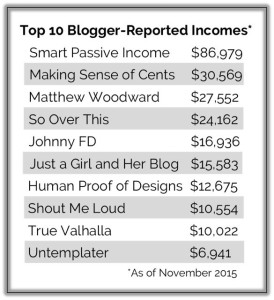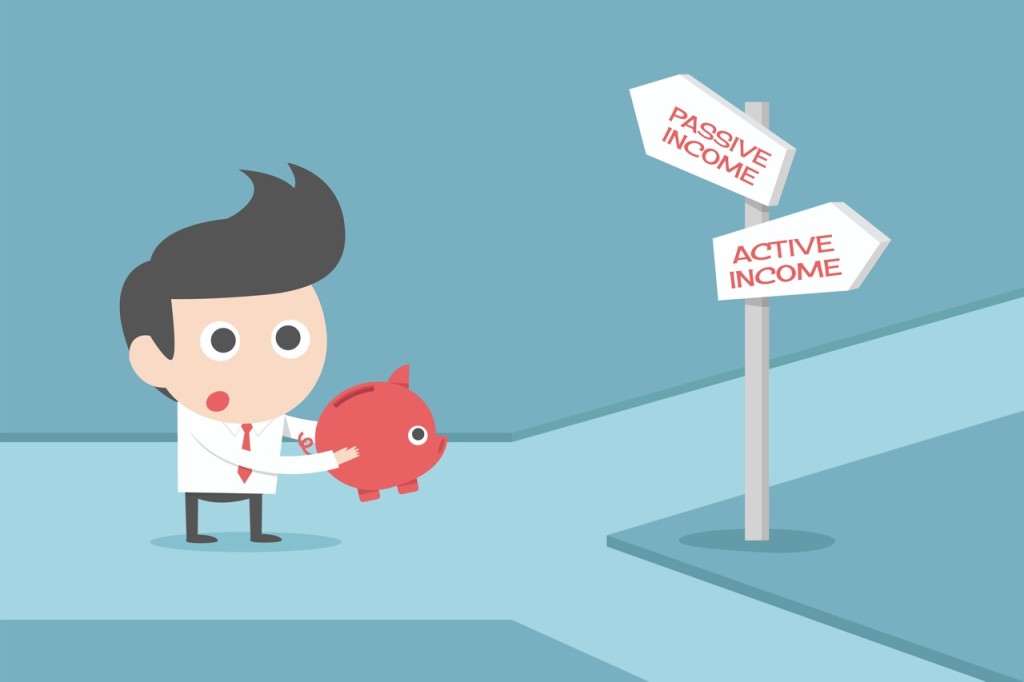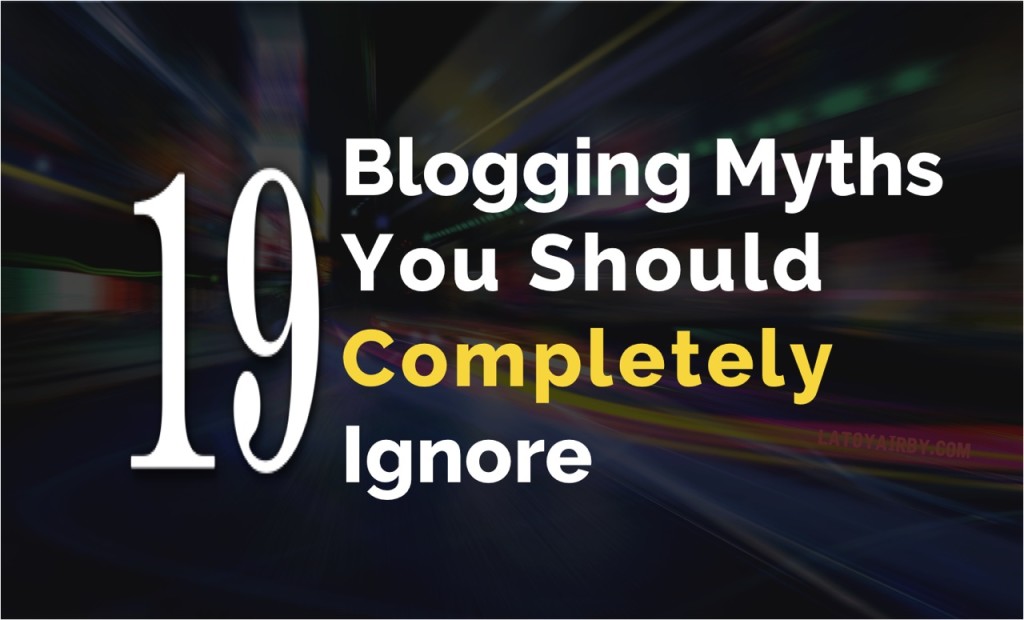Tell anyone you’re thinking of starting a blog and expect the comments to start rolling in like the spring tide.
If you’re lucky, your friends and family will be supportive when they find out you want to start a blog. Unfortunately, some of them may only perpetuate myths they’ve heard from others or read online. Don’t listen to the negativity.
Myths like these are like seeds of doubt. They grow in the back of your mind, haunting you anytime it seems like your blog isn’t taking off the way you thought it would.
If you ultimately decide that blogging isn’t for you, don’t let the reason be that you listened to one of these incredibly untrue myths about blogging.
1. “Blogging isn’t a real job.”
The first blog was created less than two decades ago and blogging has only become “mainstream” in the past several years. When people say that blogging isn’t a real job, it’s because they’re thinking of traditional jobs like teachers, attorneys, doctors, nurses, etc.
Blogging, especially as a freelancer or for yourself, gives you freedom and flexibility you don’t get from traditionally “real” job. People may not consider blogging a real job, but you can definitely earn real money. What matters besides that?
2. “You have to write well to be a successful blogger.”
This is only partly true. Your writing doesn’t have to be Pulitzer worthy and that’s fine because fancy writing could alienate your target readers – who likely read on a 7th or 8th grade level. You should be able to write simple sentences and convey your message clearly. You should be able to present your thoughts and ideas clearly using proper spelling and grammar.
3. “You can’t make money blogging.”
If anyone says this to you, just laugh. Cash Flow Diaries has an ultimate list of blogger income reports that proves making money from blogging isn’t just a fluke. The top 25 bloggers on the list an average of $11,520 in a single month.

How many of those “Blogging isn’t a real job” critics makes that much in a month? The highest reported net income was just a few dollars shy of $89K and this is just one month of income. This list only includes bloggers who report their own monthly income. I’m sure there are thousands of bloggers making money who aren’t publicly reporting it each month.
4. “There are already enough blogs on blogging/fashion/makeup/fitness/etc.”
Certain niches contain more blogs than others, but that doesn’t mean there’s no space for you. If you’re passionate about a niche that seems saturated, put a creative angle on the topic to make it unique enough from the other blogs in the niche.
5. “You’ll eventually run out of ideas.”
I remember someone telling me this when I first started writing for About.com. That was over 8 years ago and I still have tons of new ideas every single month and lists of ideas I’ve accumulated over the years. I will admit that once the basics are covered, it gets a little tougher to come up with catchy topics. The challenge at that point is to go deeper into your topic and approach it from different perspectives.
6. “There’s no cost to starting a blog.”
This is partly true, but it depends on the platform you’re using. You can start a blog for no cost at all on a free platform like Tumblr, Blogger, or Wordpress. However, the most successful blogs are self-hosted, which does come at a cost, but you can keep your costs between $100 and $200 a year. For example, I offer a coupon code, GET25OFF, for getting WordPress hosting through HostGator for awesome savings.
7. “Selling ad space is the best/only way to make money blogging.”
There are several different strategies for making money blogging and ad space is just one of them. It may be the best for some blogs, but bloggers make more money through affiliate programs, speaking engagements, and selling their own information products, in addition to selling ad space. You may have to try out different strategies – or a combination of strategies – to figure out which will be the best for you.
8. “Blog income is passive income”
Lots of people start a blog because they believe it can earn them thousands of dollars with only a little bit of effort. While you don’t have to necessarily work dollar for dollar for what you earn, you do have to set up the blog, research topics, research readers, write your posts, promote your blogs, and stay on top of blogging and news trends.

© beachboyx10 / dollarphotoclub.com
9. “Great content is all it takes to be a successful blogger.”
The truth is that great content is only a small portion of what it takes to be a successful blogger. What if no one reads all the great content you’re posting to your blog? How successful are you then? What if people read, but they don’t click your ads or buy your products? Still successful?
Besides good content, you also have to know about optimizing your posts for search engines, including images or other media as needed. Then, you have to figure out the best way to get people to actually read all the great content you’ve written and buy whatever it is you’re selling.
10. “You must have a lot of traffic to make decent money blogging.”
This may apply to free blogs which often prohibit bloggers from using ads unless they receive a minimum amount of monthly traffic. Other than that, fraffic is only loosely correlated to blog income. You can have hundreds of thousands of visitors coming to your blog each month and never make a cent if they’re not convinced to click your ads or buy your product. You can have a small amount of the right kind of traffic and make far more money than having tons of random traffic who aren’t truly interested in your niche.
11. “You can become an overnight success.”
Behind every “overnight success” is years of hard work, dozens of false starts, and tons of mistakes. Even traffic from viral posts is often temporary. Real success is cumulative; it’s built little by little over a period of time. How much time depends on lots of different factors, many of which you can completely control. So don’t give up because your blog isn’t getting hundreds of thousands of page views after just a couple of months. That kind of traffic takes time to build.
12. “It’s better to start with a free site just in case blogging doesn’t work out.”
If you’re not willing to commit just $100 to start a blog, maybe blogging isn’t for you. Free blogs force you to include their name as part of the URL address making your website address something long like: mynewnicheblog.wordpress.com instead of mynewnicheblog.com.
When you pay for hosting you can start generating income from day one and any revenue you make is all yours. Free blogging sites may limit the amount of storage space, which would require you to use third-party services like Flickr to store your images and Dropbox for files.
If you don’t take your blog seriously enough to pay for a domain and hosting, why would your readers take you seriously?
13. “Blogging a lot will is the only way to be successful.”
The more time you spend blogging, the less time you have for all the other activities that go into having a successful blog like networking, marketing, and managing your sales. Great content takes time to create and it’s tough to create a quality blog post every single day. Plus, frequent blogging can lead to writer’s fatigue.
If you believe daily blogs are key to blog growth, work toward generating enough blog income so you can hire writers to help with the content load or to do some of your other tasks to free you up for more writing.
No matter what blog frequency you ultimately choose, make sure you put out quality posts on a consistent schedule.
14. “Picking a niche will limit what you can talk about on your blog.”
It will and with good reason. In my post on blogging rules, I compared niches and blog posts to television channels and the programming on those channels. ESPN, for example, doesn’t broadcast shows on any and everything. The network shows sports content only and that’s why it’s one of the top-rated sports networks in the nation. Do you think ESPN would be as successful if they started showing cooking shows? Nope, people would start going elsewhere for their sports content. Or, a competitor would take the opportunity to steal viewership.
15. “You can’t be successful unless you SEO every post.”
Optimizing your posts for search engines is a great traffic boosting strategy, but you don’t have to use it for all of your posts. Some posts may not be keyword-friendly and trying to force keywords can make your writing sound unnatural to readers.
Don’t rule out posts because you can’t make them search engine friendly, there are other ways to get traffic to these posts. But make sure you are using search engine optimization tactics for all the posts you can, where it makes sense of course.

© Marek / dollarphotoclub.com
16. “If you’re not successful right away, then blogging isn’t for you.”
There aren’t many blogs that launch to thousands of waiting fans. If you dig through the archives of your favorite professional bloggers, you’ll see that they were blogging years before they became successful. It can take several months, years even, to build a successful blog and that’s perfectly normal.
17. “You have to be an expert in X to be a successful blogger.”
A blog is not an encyclopedia. Most bloggers are very upfront about letting you know they’re not experts in their fields and some blogs are based on a “learn with me” type of style.
Expertise isn’t necessary, but be honest about what you do and don’t know. Your readers will appreciate your authenticity. After several years of research and writing, you can definitely establish yourself as an authority on your topic.
18. “All you have to do is start blogging and people will find you.”
There are millions of blogs on the internet and more being started every day. It’s extremely unlikely that someone will just stumble upon your blog and it goes viral. You have to actively promote your blog through search engine optimization, social media, email, and other marketing tactics to spread the word and start building traffic.
19. “You have promote on every social media platform to be successful.”
The top social media platforms (right now) include Facebook, Twitter, Instagram, Pinterest, and YouTube. Not all of these platforms will produce the best results for your blog. Plus, trying to run a blog and maintain an active social media presence on multiple platforms can get overwhelming. You won’t able to do it all. Start out by focusing on just one or two platforms, the ones your target readers are mostly likely to use.
Sure there are some hurdles in building a successful blog, but don’t let any of these blogging myths keep you from trying.


Leave a Reply